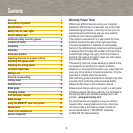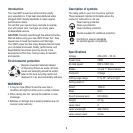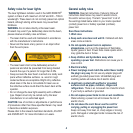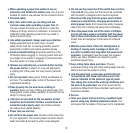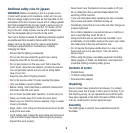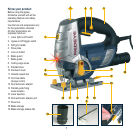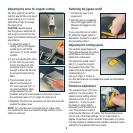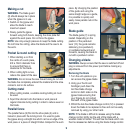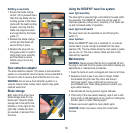
8
Adjusting the shoe for angular cutting
The shoe plate (4) should be
kept flat against the work piece
when making a cut. It can be
tilted left and right to change
the angle of cut.
CAUTION. Always ensure
that the jigsaw is switched off
and plug is removed from the
power point before making any
adjustments.
1. To adjust the angle of
cutting, first turn the jigsaw
upside down and lift the
shoe lock (17) to the vertical
position.
2. If you are adjusting the shoe
for the first time you need
to turn the shoe lock anti-
clockwise until it is loose
enough to allow the shoe to
be moved forward and be
tilted.
3. The shoe plate can be
tilted to set positions at
45° each way and at 0°. It
can also be tilted to other
angles between the set
positions using the scale located on the base, close to
the pendulum lever (10), to judge the angle of cut.
4. Retighten the shoe lock clockwise and press the lever flat
against the jigsaw base.
NOTE. For accurate work it is necessary to make a trial
cut, measure the work and reset the angle until the correct
setting is achieved.
Switching the jigsaw on/off
1. Connect the plug to the
power point
2. Start the tool by squeezing
the on/off trigger switch (2).
Release the trigger to stop
the tool.
If you press the lock on button
(5) while the trigger switch is
depressed, the switch is kept in
the operating position.
Adjusting the cutting speed
The variable speed feature of
this jigsaw enhances the cutting
performance and saves the
blade from undue wear.
The electronic speed control
dial (11) is used to program
the speed of the blade. The
speed should be adapted to the
material being cut.
Use your finger or thumb to
turn the dial forwards to increase the speed and backwards
to decrease it.
Pendulum adjustment
The pendulum lever (10) has 4
positions. The first position “0”
selects normal cutting without
pendulum action. The next 3
positions (1, 2 and 3) cause
the blade to swing slightly
backwards and forwards as it
cuts. This pendulum actions
increases the efficiency of cutting. Set the pendulum lever
(10) to one of the three settings (1,2 or 3) according to
degree of pendulum action required. Experiment on a piece
of scrap material to determine the optimum pendulum action
setting for the material of the work piece.




